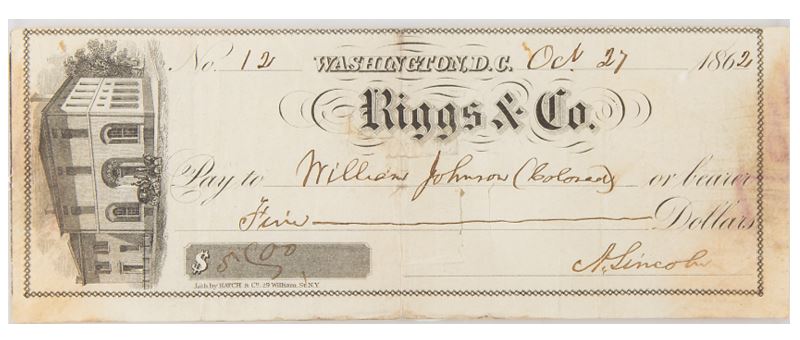Abraham Lincoln signed check to “William Johnson (Colored),” who accompanied Lincoln from Springfield to Washington, D.C., served as the president’s personal valet, and travelled with him to Antietam (25 days before this check) and a year later to Gettysburg.
Extraordinary Riggs & Co. check filled out and signed by Lincoln as president, payable to “William Johnson (Colored)” for $5, October 27, 1862. Lincoln’s identification of the payee as “colored” allowed him to cash the check without additional difficulty. 7.5 x 2.7”
William Henry Johnson was a free Black man who accompanied the president-elect on his journey, while under threat of assassination, from Springfield to Washington, D.C. The February 19, 1861 issue of The New York Times reported that Johnson, whose ‘untiring vigilance’ as ‘he took care of the Presidential party is entitled to high credit'” (per Burlingame, Abraham Lincoln: A Life, 2:24).
Upon arrival in the capital, Lincoln found Johnson employment stoking the furnace of the Executive Mansion. The other Black White House workers “objected to his dark complexion so vehemently that Lincoln had to find him another post” (Burlingame, 2:252). Lincoln unsuccessfully tried to secure a new position for Johnson with Navy Secretary Gideon Welles. On November 29, 1861, the president wrote to Treasury Secretary Salmon P. Chase: “You remember kindly asking me…whether I really desired you to find a place for William Johnson, a colored boy who came from Illinois with me. If you can find him the place [I] shall really be obliged” (Basler 5:33).
Hired as a Treasury Department porter, Johnson continued to serve Lincoln privately, shaving and preparing his outfit each morning. Johnson was the president’s barber, butler, groomer, fire-keeper, bootblack, valet, driver, messenger (sometimes delivering significant sums of money) and even occasionally bodyguard.[1] Lincoln said of him, “although not exactly the most prominent, [he] is yet the most useful member of the presidential party.”[2]
Two weeks after the battle which finally allowed Lincoln to issue the Preliminary Emancipation Proclamation, Johnson accompanied Lincoln to the Antietam Battlefield on October 2, 1862. The president visited with Grant, reviewed the troops and paid respects to wounded soldiers. It is interesting to speculate, but we don’t know if this check, 25 days later, relates to that trip.
Johnson’s most consequential trip with Lincoln was to Gettysburg for the dedication of the Soldiers’ National Cemetery. Mary Lincoln had to stay home to tend to son Tad, who had a mild case of smallpox. On the morning of November 18th, Lincoln sent a brief note to the Department of Treasury: “William goes with me.” Johnson is the only Black man known to have travelled on the President’s train to give the Gettysburg Address. Lincoln likely already was ill, though he may not have known it yet. During the train ride, he looked “sallow, sunken-eyed, thin, careworn”.[3] Reporters at the ceremony described him as “listless”, “sweating”, and “discouraged.”
On the return trip, Johnson nursed Lincoln for a bad headache, bathing his forehead in cold water.[4] Back at the White House, Lincoln was diagnosed with “varioloid,” the same mild form of smallpox that Tad had. In the president’s case, though, he may have been underdiagnosed for the benefit of Mary and the public. He was in fact seriously ill, quarantined and bedridden for three weeks.[5] (Though not so ill to forget his sense of humor. He joked that since becoming president, office-seekers and politicians were constantly asking him for things he couldn’t provide, but now, at least, “I’ve got something I could give to everyone.”
Johnson contracted the disease right around then. On January 18, 1864, a Chicago Tribune reporter found the recovered Lincoln counting out money [for Johnson], and quoted his explanation: “A President of the United States has a multiplicity of duties not specified in the Constitution or acts of Congress… The money belongs to a poor negro who is a porter in one of the departments and who is at present very bad with the smallpox.…He is now in hospital, and could not draw his pay because he could not sign his name. I have been at considerable trouble to overcome the difficulty and get it for him, and have at length succeeded in cutting red tape.” Clearly, Lincoln was doing that for Johnson, who tragically died ten days later.
Lincoln purchased his coffin, sent money to his family, and paid off half of a loan that he had previously cosigned for Johnson; the banker insisted on canceling the other half.
Only two other Lincoln checks to black people have appeared at auction in the last 40 years, both also for $5.


